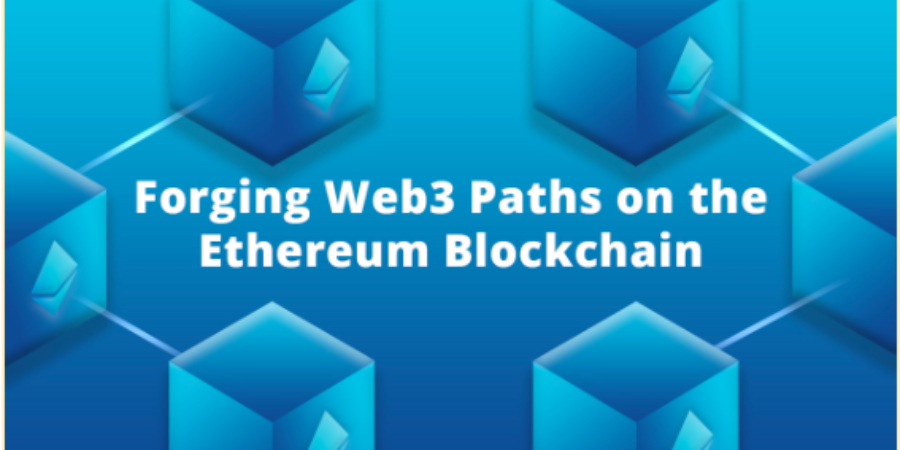It’s only logical for the Web3 evolution to incorporate artificial intelligence (AI) in its growth journey. As it stands, AI is influencing every software category so Web3 should not be left behind.
Before looking at the interconnection between Web3 and AI, a distinction ought to be made on the three components influencing the future of Web3. The most important element is the blockchain, then we have dApps running on the blockchain, and at the tail end protocols exist. Now since AI can be uniquely applied in all three components, how will it not influence the future of Web3?
So, a question arises about what exactly Web3 entails.
Web3: A Brief Introduction
To put it in the simplest of terms, this is a new iteration of the world wide web whose technology allows for protocols to host decentralized applications that run on a blockchain. Web3 proponents envision it taking different forms in different fields such as having decentralized social networks, play-to-earn games, digital asset platforms that allow people to buy and sell pieces of the booming decentralized digital culture or even AIWORK’s video content space.
Web3 is poised to bring freedom, democracy, and true ownership of digital assets to its users. These will be attained through improved data privacy such that users will know exactly what’s happening with their data as well as an emphasis on online pseudonymity which means that users that prefer to remain anonymous can do so.
Web3 is gaining a lot of traction online with more of its advocates insisting that it will bring with it a new way to redistribute ownership of the internet. We have to get the ownership and decision-making sectors away from a few individuals and transfer them to the community. Democracy calls for multiple users to take part in making decisions that govern the direction of a large organization as opposed to giving all the power to a central administration. This means that dApps hosted on Web3 platforms will be run by decentralized autonomous organizations ensuring that shareholders discuss the changes brought forth, vote on them, and then they can be implemented by the CEO.
A Look into the Web3 Video Ecosystem
The video content space is expected to receive a full overhaul thanks to Web3, from film production, to financing, and even distribution. We already have crypto projects offering monetized streaming services, where you get paid for uploading content. However, users want this to go even further such as having advanced NFT and video tools on one platform, making it easier for creatives to come up with new experiences and content, own and monetize their craft, and potentially make the leap into the open metaverse.
One project in the video entertainment realm making waves is AIWORK and the main reason they are raising eyebrows is because they went all in and intertwined blockchain technology with artificial intelligence then came up with a protocol focused on video content. AIWORK is a blockchain network that facilitates a marketplace of crowdsourced AI Human Experts to help create, verify and validate AI data sets that make AI smarter.
AIWORK’s Path onto Web3: How Will the Ethereum Blockchain Benefit from AIWORK’s Web3 Efforts?
This is where the elements of blockchain, dApps, and protocols mentioned earlier come into play. Built on the Ethereum blockchain, AIWORK brings decentralization to the creation, distribution, and viewing of video content. The decentralized nature of the Ethereum blockchain means that committing fraud when uploading or watching video content is near impossible since the chain records every upload and view on different servers. Given that AIWORK’s AI machinery can mine through data more quickly and efficiently, the platform can accurately predict a creator’s or viewer’s behavior based on that data. An advanced AI system such as the protocol’s Content Graph can predict fraudulent behavior and will stop fraudulent actions in their tracks.
Entry into the Web3 realm is much easier for the Ethereum blockchain with projects such as AIWORK that deploy artificial intelligence which helps analyze patterns through machine learning and help proactively make the underlying architecture smarter. Developers can also build decentralized applications on top of the AIWORK protocol and thanks to its AI machinery, in the future we might even see video content that will be able to continually learn from the actions of the creators/viewers and work towards making the uploading and viewing processes more seamless.
At the moment AIWORK is working on improving its AI Computer Vision algorithms running on nodes using CPU/GPU resources to be used to scan media files, generate enhanced metadata including time-coded tags, classification, categories, transcripts and translations, and an index of the video objects. Humans with expertise in tagging, editing and translation can participate in the AIWORK shared economy to help with the verification, validation, and/or creation of video metadata. In the spirit of bringing Web3 to its masses, AIWORK will empower the community with tools to enable the community to moderate, review, verify the meta-tags, categorize, transcribe and/or translate content, as well as provide economic incentives to encourage this activity thru AWO (AIWORK Tokens). This is what democracy calls for in this new form of the world wide web.
With this new understanding of AI and Web3, it is important for users to focus on joining platforms that provide them with the tools to build for the future we anticipate. AIWORK has revealed to us the potential it holds with its powerful blockchain and AI toolkit that allows developers, creators, and video content viewers to access blockchain infrastructure, integrate dApps, and do much more.
Visit AIWORK’s socials to learn more about the project and its journey onto Web3 and the Metaverse: Website | Telegram | Twitter | Medium
I’m a highly experienced and successful crypto author with over 10 years of experience in the field. I have written for some of the most popular crypto publications, including Bitcoin Magazine, CoinDesk, and Crypto Insider. I have also been featured in major mainstream media outlets such as Forbes, Wall Street Journal, and Business Insider.

